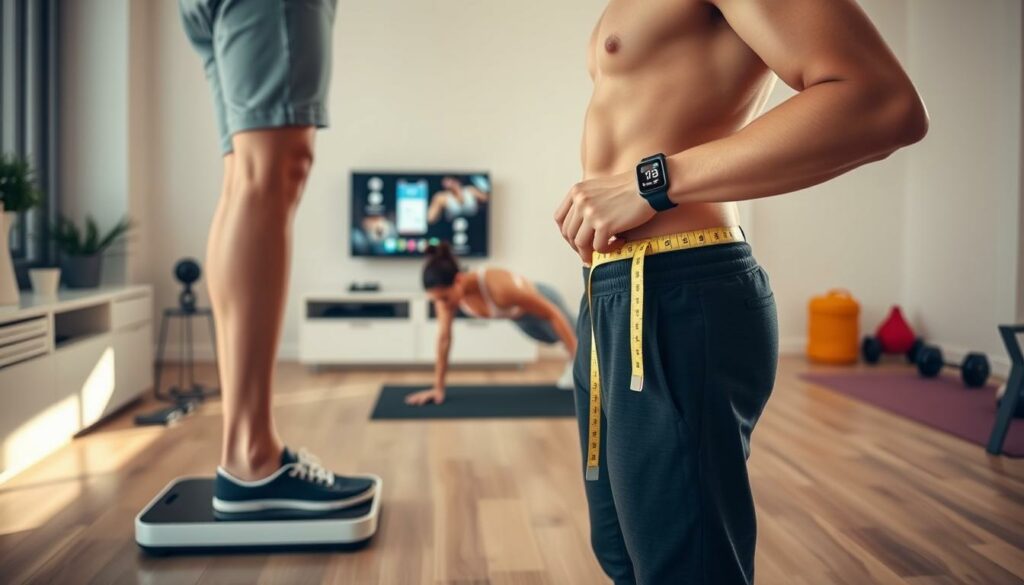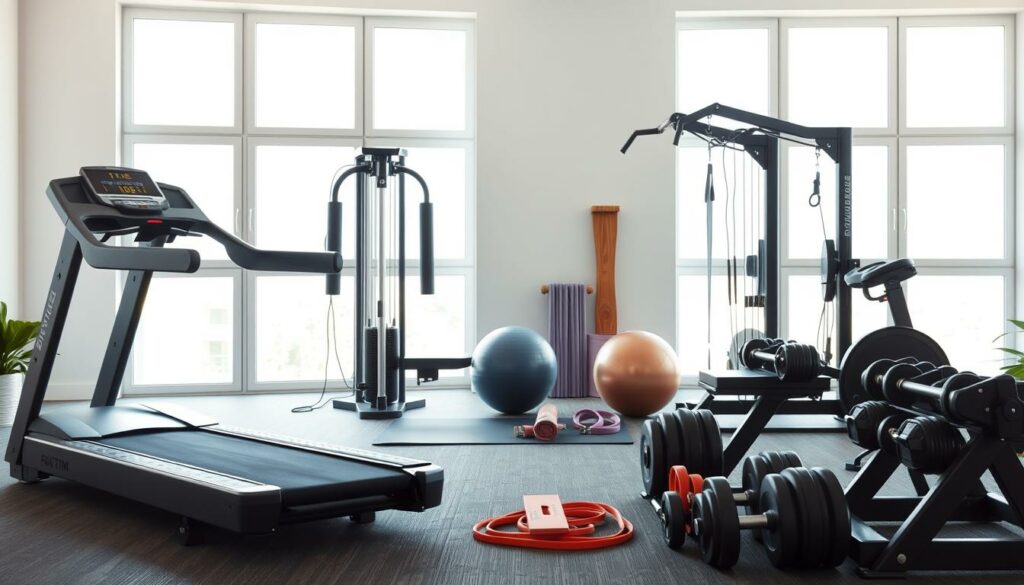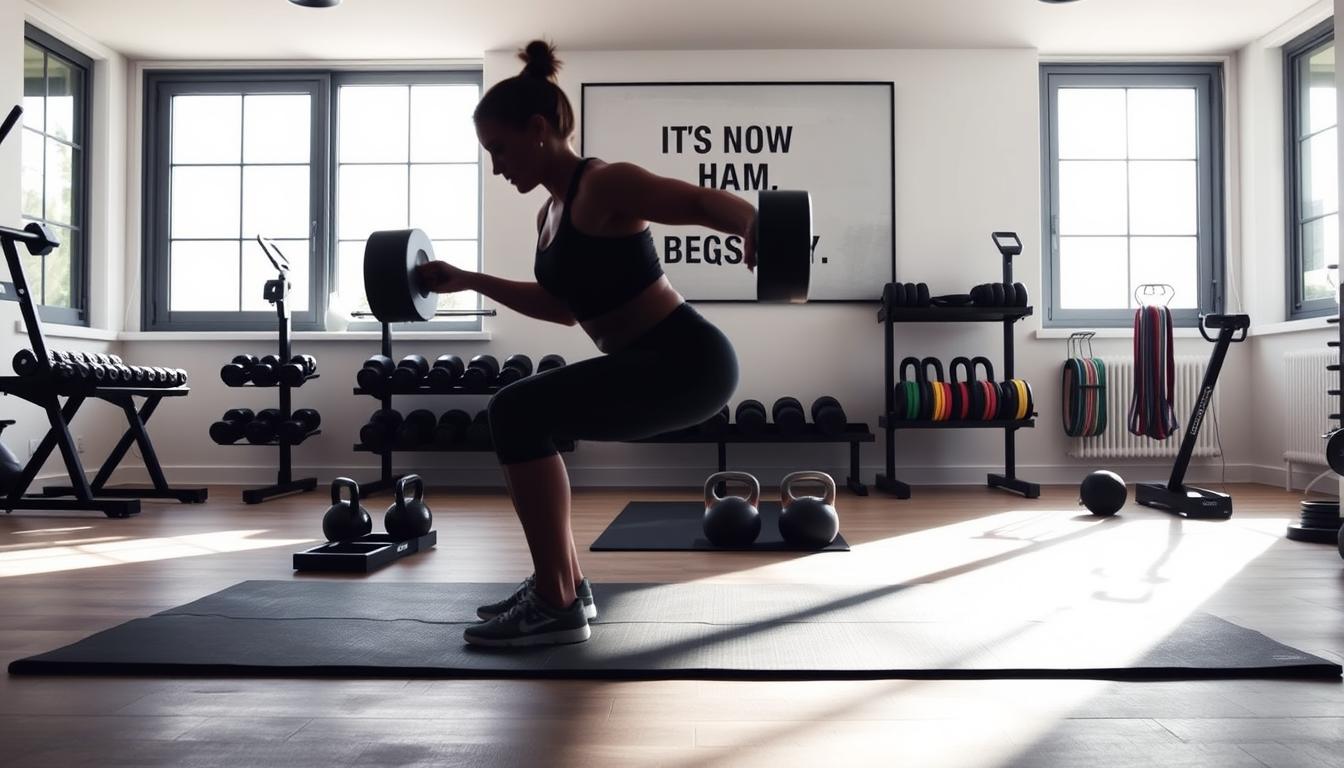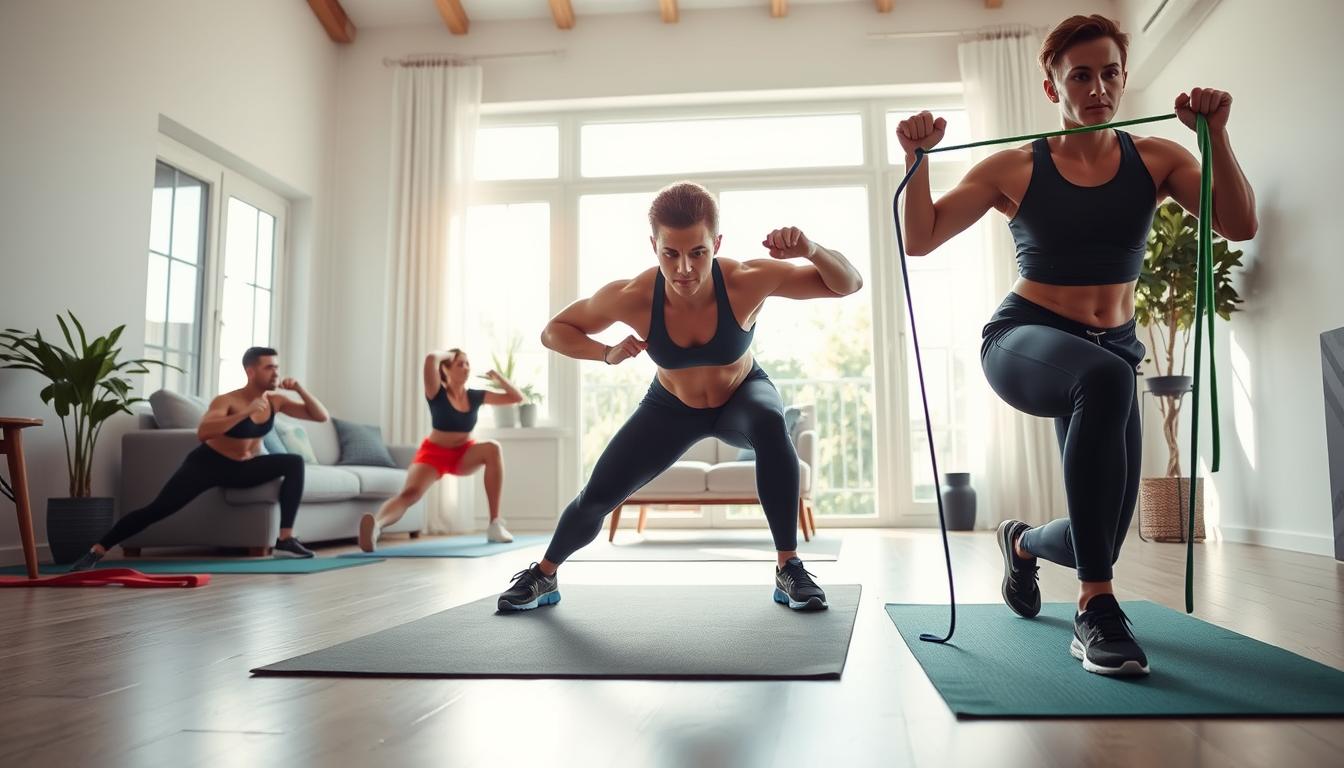The secret to successful fat loss is a well-structured home workout routine that meets your needs. In 2025, it’s time to elevate your fitness journey with a personalized approach to fitness at home.
Key Takeaways
- Understand the importance of a well-structured home workout routine for fat loss.
- Learn how to tailor your workout routine to your specific needs.
- Discover effective strategies for burning fat at home.
- Get insights into the latest fitness trends in 2025.
- Start your journey to a fitter, healthier you with a home workout routine.
The Science Behind Fat Burning in2025
Burning fat is a complex process. It involves many metabolic mechanisms that are influenced by exercise and lifestyle. To burn fat well, you need to know how your body uses energy and how different factors affect this.
Understanding the Metabolic Mechanisms of Fat Loss
Fat loss happens when your body uses fat for energy. Your metabolic rate, which can change with age, gender, genetics, and muscle mass, plays a big role. Building muscle through strength training can increase your resting metabolic rate (RMR). This means your body burns more calories even when you’re not moving. The type and intensity of your workouts also affect how well you lose fat.

2025's Breakthrough Research on Exercise Efficiency
Recent research in 2025 has found new ways to make exercise better for fat loss. Studies show that high-intensity interval training (HIIT) is very good at burning fat. It not only burns calories during the workout but also increases calorie burn after the workout.
How Modern Lifestyle Factors Impact Fat Burning
Modern lifestyle factors like diet, sleep, and stress levels greatly affect fat burning. Eating too much processed food and sugar can slow down fat loss. But getting enough sleep and managing stress can help your metabolism. Knowing these factors is key to a successful fat loss plan.
Assessing Your Current Fitness Level and Setting Realistic Goals
Understanding your current fitness level is key to a successful workout plan. You need to know your strengths, weaknesses, and areas for growth. This helps in creating a workout routine that works for you.
Performing Simple At-Home Fitness Assessments
Start by doing simple tests at home. Check your body fat percentage and how well you do in weight loss exercises. You can also test your heart health by timing a 1-mile walk or run.

Creating Measurable and Time-Bound Fat Loss Goals
Setting achievable goals is vital for success. Aim for specific, measurable, and timely fat loss goals. Break down big goals into smaller steps to stay motivated.
Implementing Digital and Physical Progress Tracking Methods
Track your progress with both digital and physical tools. Use a fitness tracker or app to monitor your workouts and diet. Also, keep a log to record your journey and reflect on your progress.
Essential Equipment for Effective Home Workouts in2025
In 2025, the right equipment can make your home workouts better. They help you lose fat more efficiently. Knowing what options are out there is key for a good effective exercise plan.
No-Equipment Options That Deliver Results
You don’t need to buy equipment for a great home workout. Bodyweight exercises like push-ups, squats, and lunges work well. They use many muscles at once, boosting your metabolism and burning fat.
Budget-Friendly Tools with Maximum Fat-Burning Impact
If you want to buy some gear, consider affordable options. Resistance bands and jump ropes can really improve your workout. Resistance bands, for example, let you do many exercises that target different muscles.
Next-Generation Fitness Technology Worth Investing In
The fitness world is getting tech-savvy. New tools like smart resistance systems and AI-powered workout mirrors are gaining fans.
Smart Resistance Systems
Smart resistance systems let you adjust how hard your workout is. They’re great for building strength, giving you a full-body workout.
AI-Powered Workout Mirrors
AI workout mirrors give you feedback on your form and suggest workouts. They keep you motivated and help you do exercises right.
| Equipment Type | Cost | Effectiveness for Fat Loss |
|---|---|---|
| No-Equipment | $0 | High |
| Resistance Bands | $10-$30 | High |
| Smart Resistance Systems | $200-$500 | Very High |
| AI-Powered Workout Mirrors | $1,000-$2,000 | Very High |

Designing Your Workout Space for Maximum Efficiency
To get the most out of your home workouts, setting up a dedicated area is key. A well-organized space keeps you focused and motivated. This leads to better workouts.
Optimizing Small Spaces for Full-Body Workouts
You don’t need a big area for a great workout spot. Use small spaces wisely for full-body exercises. Try equipment like resistance bands or a pull-up bar.
Here’s a simple layout to consider:
| Equipment | Space Requirement | Benefits |
|---|---|---|
| Resistance Bands | Minimal | Portable, versatile, and cost-effective |
| Pull-up Bar | Compact | Effective for upper body workouts |
| Yoga Mat | Standard | Provides cushioning and grip for floor exercises |
Creating an Environment That Triggers Workout Consistency
Your workout area’s vibe is key to staying consistent. Think about lighting, temperature, and music. Bright lights and a comfy temperature make workouts better.
Essential Safety Considerations for High-Intensity Home Training
High-intensity workouts at home need safety first. Make sure your area is safe and has good air flow. Keep a first-aid kit handy.
By keeping these tips in mind, you can make a safe and effective workout space at home. It will help you reach your fitness goals.
How to Build a Home Workout Routine That Actually Burns Fat in2025
Creating a home workout routine that burns fat is a step-by-step process. It begins with knowing your goals. You need a plan that includes different exercises and time for rest.
Step 1: Determining Your Optimal Weekly Workout Frequency
First, figure out how many days a week you can work out at home. Studies show that 3 to 4 days a week is best for losing fat. This schedule lets you exercise enough to burn fat and rest enough to recover.
Step 2: Structuring Your 7-Day Training Split for Fat Loss
After deciding on your workout days, plan your 7-day routine. A good routine mixes cardio, strength training, and flexibility exercises. For example, spend 3 days on strength training, 2 on cardio, and 1 on rest or active recovery.
Step 3: Balancing Cardio, Strength, and Recovery Periods
It’s important to balance your workouts. Cardio like running or cycling burns calories during exercise. Strength training builds muscle, which helps burn more calories even when you’re not working out. Make sure to include recovery periods to avoid burnout and injuries.
Step 4: Implementing Progressive Overload Without Plateauing
To keep making progress and avoid hitting a plateau, use progressive overload. This means increasing the weight, reps, or sets over time. For example, you can make bodyweight exercises harder or use resistance bands.
| Workout Component | Example Exercises | Frequency |
|---|---|---|
| Cardio | Running, Cycling, HIIT | 2-3 times a week |
| Strength Training | Squats, Push-ups, Lunges | 3-4 times a week |
| Flexibility & Recovery | Yoga, Stretching | 1-2 times a week |
By following these steps and making your home workout routine fit your needs, you can burn fat and reach your fitness goals in 2025.
High-Intensity Interval Training (HIIT) Protocols for Maximum Fat Loss
HIIT is a great way to lose fat quickly and efficiently. It involves short, intense workouts followed by brief breaks. These cycles can last from a few minutes to half an hour, depending on the protocol and your fitness level.
10-Minute HIIT Sequences for Beginners
Beginners can start with 10-minute HIIT sequences. These include exercises like burpees, jump squats, and mountain climbers. A routine might be 30 seconds of intense exercise followed by 30 seconds of rest, repeated for 10 minutes. This not only burns calories during the workout but also boosts your metabolism for hours after.
20-Minute Intermediate HIIT Routines That Target Stubborn Fat
As you get fitter, you can move to 20-minute HIIT routines. These routines target stubborn fat areas and might include more complex exercises or higher intensity. For example, a 20-minute routine could be 45 seconds of intense exercise followed by 15 seconds of rest.
Advanced HIIT Techniques to Break Through Plateaus
For those who are more advanced, you can try Tabata or HIIT with resistance bands. These methods add more intensity and variety to your workouts. They help you break through plateaus and keep making progress.
Strategic Recovery Methods to Support Frequent HIIT Training
Recovery is key when doing HIIT often. Good recovery includes proper nutrition, staying hydrated, and getting enough rest. Stretching and foam rolling can also help reduce muscle soreness and improve recovery.
| HIIT Protocol | Duration | Intensity | Rest Period |
|---|---|---|---|
| Beginner | 10 minutes | High | 30 seconds |
| Intermediate | 20 minutes | Very High | 15 seconds |
| Advanced | 30 minutes | Extremely High | 10 seconds |
By using these HIIT protocols and recovery strategies, you can maximize fat loss. This way, you can avoid injury or burnout.
Strength Training Components to Accelerate Fat Burning
Strength training is a key part of an effective exercise plan for burning fat. Adding the right strength training elements can boost your fat loss journey.
Full-Body Compound Movements That Maximize Calorie Burn
Full-body compound movements are key for burning calories during strength training. Squats, deadlifts, and bench presses work many muscles at once. This increases energy use and fat loss.
Adding these movements to your routine boosts your metabolic rate. You burn more calories during and after your workout.
Optimal Rep Ranges and Tempo for Fat Loss vs. Muscle Building
The best rep range and tempo for fat loss are different from muscle building. For fat loss, use 12-15 reps with a moderate to fast tempo. This boosts metabolic stress and afterburn effect, leading to more fat loss.
For muscle building, use 6-8 reps with a slower tempo. This helps grow muscles more.
Designing Supersets and Circuits for Time-Efficient Workouts
Supersets and circuits make workouts quick and effective for fat loss. Pairing exercises or using circuit training increases intensity and reduces rest time. This boosts energy use.
This method saves time and keeps workouts interesting and challenging.
Resistance Band and Bodyweight Progressions for Continuous Challenge
Using resistance bands and bodyweight exercises keeps workouts challenging. Resistance bands offer varying resistance, while bodyweight exercises can be made harder. Increasing resistance or intensity keeps muscles challenged and promotes fat loss.
Common Mistakes That Sabotage Home Fat-Burning Workouts
To burn fat effectively with a workout routine, you must avoid common mistakes. Many people struggle to lose fat because of errors in their home workouts.
Intensity Errors That Limit Fat Burning
One big mistake is not working hard enough. Insufficient intensity means you burn fewer calories and see little progress. Make sure you’re using the right weight or resistance.
Another error is not changing the intensity of your workouts. Adding high-intensity interval training (HIIT) can increase your metabolism and calorie burn.
Recovery Mistakes That Lead to Burnout or Injury
Not giving your muscles enough time to recover is a big mistake. This can cause burnout or injury. Make sure you get enough sleep and include rest days in your routine.
Good nutrition is also key for recovery. Eating the right foods helps repair and grow your muscles.
Program Design Flaws That Cause Early Plateaus
A well-planned workout program is vital for progress. Avoid repetitive routines that your body adapts to too quickly. Mix up your workouts to keep challenging your muscles.
Regularly check and adjust your workout to avoid getting stuck. You might need to change exercises, increase intensity, or switch up your workout split.
Consistency Challenges and How to Overcome Them
Consistency is essential for fat loss. Common hurdles include lack of motivation, busy schedules, and distractions. Create a schedule and stick to it. Find ways to stay motivated, like tracking your progress or working out with a buddy.
Knowing these common mistakes and how to avoid them can help you make the most of your home workouts for fat loss.
Nutrition Strategies to Complement Your Fat-Burning Workouts
To lose fat effectively, you need to match your workouts with the right diet. A good nutrition plan boosts your fitness goals and makes your workouts better.
Optimizing Meal Timing Around Home Workouts
When you eat around your workouts matters a lot. Eat a balanced meal with protein and carbs 1-2 hours before working out. This gives you the energy and helps your muscles work well. After working out, eat a mix of protein and carbs in 30-60 minutes. This helps your body recover and repair muscles.
Macronutrient Ratios That Support Fat Loss in 2025
Knowing your macronutrient ratios is key for losing fat. A good diet has 15-20% protein, 25-35% fat, and 45-55% carbs. You can adjust these based on your needs and progress. For example, eating more protein helps keep muscle when you’re on a calorie diet.
Hydration Protocols for Enhanced Metabolic Function
Drinking enough water is vital for your metabolism and health. Drink 8-10 glasses of water a day to stay hydrated. Also, check your urine color. If it’s pale yellow, you’re drinking enough water.
Evidence-Based Supplements for Fat Loss Acceleration
While a balanced diet is essential, some supplements can help with fat loss. Green tea extract, CLA, and protein powder are proven to aid in losing fat. But, always talk to a doctor before taking any supplements.
- Green tea extract: Boosts metabolism and fat burning
- Conjugated linoleic acid (CLA): May help in reducing body fat
- Protein powder: Supports muscle mass and satiety
By adding these nutrition tips to your life, you can make your workouts more effective. This will help you reach your fitness goals faster.
Conclusion: Sustaining Your Results Beyond2025
Keeping up with your fitness goals is key. To keep losing fat after 2025, make a lifestyle change. This should include regular home workouts and healthy eating.
Being consistent is important. Stick to a workout plan that includes cardio, strength training, and rest. Watch your progress and change your routine if needed. Also, focus on eating well by timing your meals and staying hydrated.
By making these habits part of your daily life, you’ll keep getting better. A sustainable lifestyle with home workouts and smart eating will help you succeed in your fitness journey.


